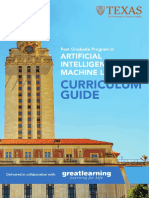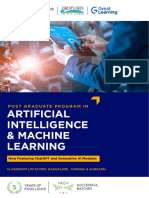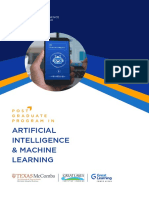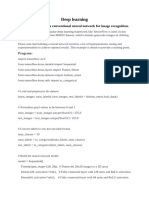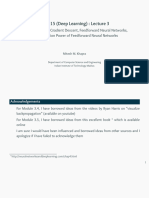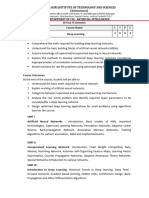Python Machine Learning with AI Training Syllabus
Uploaded by
gowthamali06Python Machine Learning with AI Training Syllabus
Uploaded by
gowthamali06Python Machine Learning with AI Training Syllabus
Course Overview
This course provides a comprehensive introduction to Machine Learning (ML) and Artificial
Intelligence (AI) using Python. Students will learn key ML algorithms, AI concepts, and practical
implementation using Python libraries like Scikit-learn, TensorFlow, Keras, and PyTorch.
Prerequisites
Basic knowledge of Python programming
Understanding of mathematics (linear algebra, calculus, statistics)
Familiarity with data structures and algorithms (helpful but not mandatory)
Course Duration
1. Total Duration: 8-12 weeks (flexible based on intensity)
2. Weekly Commitment: 5-10 hours (lectures + hands-on projects)
Syllabus Breakdown
Module 1: Introduction to Python for ML & AI
1. Python basics (refresher)
2. NumPy for numerical computing
3. Pandas for data manipulation
4. Matplotlib & Seaborn for data visualization
5. Jupyter Notebooks for ML workflows
Module 2: Fundamentals of Machine Learning
What is Machine Learning?
1. Types of ML: Supervised, Unsupervised, Reinforcement Learning
2. ML workflow: Data collection → Preprocessing → Training → Evaluation
3. Bias-Variance Tradeoff
4. Overfitting & Underfitting
Module 3: Supervised Learning
1. Regression:
2. Linear Regression
3. Polynomial Regression
4. Ridge & Lasso Regression
Classification:
Logistic Regression
Decision Trees & Random Forests
Support Vector Machines (SVM)
Naive Bayes
K-Nearest Neighbors (KNN)
Evaluation Metrics (MSE, R², Accuracy, Precision, Recall, F1, ROC-AUC)
Module 4: Unsupervised Learning
1. Clustering:
2. K-Means
3. Hierarchical Clustering
4. DBSCAN
5. Dimensionality Reduction:
6. Principal Component Analysis (PCA)
7. t-SNE
8. Anomaly Detection
Module 5: Deep Learning & Neural Networks
1. Introduction to Deep Learning
2. Perceptrons & Activation Functions
3. Feedforward Neural Networks (FNN)
4. Training Neural Networks (Backpropagation, Gradient Descent)
5. TensorFlow & Keras Basics
6. Convolutional Neural Networks (CNN) for Image Processing
7. Recurrent Neural Networks (RNN) for Time Series & NLP
Module 6: AI & Advanced Topics
1. Natural Language Processing (NLP) with Python (NLTK, spaCy, Transformers)
2. Reinforcement Learning Basics (Q-Learning, Deep Q Networks)
3. Introduction to Generative AI (GANs, Transformers)
4. Model Deployment (Flask, FastAPI, ONNX)
5. Ethics in AI & Responsible AI Practices
Module 7: Capstone Project
1. End to-end ML/AI project (from data collection to deployment)
2. Real-world case studies (Healthcare, Finance, E-commerce, etc.)
3. Model optimization & hyperparameter tuning (GridSearch, RandomSearch)
4. Final presentation & code review
Tools & Libraries Covered
1. Python Libraries: NumPy, Pandas, Matplotlib, Seaborn, Scikit-learn
2. Deep Learning Frameworks: TensorFlow, Keras, PyTorch
3. NLP Tools: NLTK, spaCy, Hugging Face Transformers
4. Deployment: Flask, FastAPI, Docker
Assessment & Certification
1. Quizzes & Assignments (Weekly coding tasks)
2. Kaggle Competitions (Optional)
3. Final Project Submission
4. Certificate of Completion (Upon successful completion)
Learning Outcomes
By the end of this course, students will:
✅ Understand core ML & AI concepts
✅ Build and train ML models using Python
✅ Work with real-world datasets
✅ Implement deep learning models (CNN, RNN)
✅ Deploy ML models in production
✅ Be prepared for advanced AI/ML roles
You might also like
- Artificial Intelligence & Machine Learning Curriculum PregradNo ratings yetArtificial Intelligence & Machine Learning Curriculum Pregrad12 pages
- 4 Weeks Machine Learning and Artificial IntelligenceNo ratings yet4 Weeks Machine Learning and Artificial Intelligence3 pages
- AI & Data Science Course Curriculum-compressed (1)No ratings yetAI & Data Science Course Curriculum-compressed (1)15 pages
- Diploma in Data Science: Integrating AI, Mathematics, Python, and Machine LearningNo ratings yetDiploma in Data Science: Integrating AI, Mathematics, Python, and Machine Learning12 pages
- AIML_Domestic_Executive_Brochure_Dec_10_2024No ratings yetAIML_Domestic_Executive_Brochure_Dec_10_202425 pages
- Artificial Inteligence and Machine LearningNo ratings yetArtificial Inteligence and Machine Learning8 pages
- Machine Learning Course Content For Classroomdocx - 240504 - 163403No ratings yetMachine Learning Course Content For Classroomdocx - 240504 - 1634036 pages
- AI & Deep Learning TensorFlow, Keras, PyTorch_80 hours-1No ratings yetAI & Deep Learning TensorFlow, Keras, PyTorch_80 hours-112 pages
- Curriculum Guide: Artificial Intelligence and Machine Learning: Business ApplicationsNo ratings yetCurriculum Guide: Artificial Intelligence and Machine Learning: Business Applications8 pages
- AIML-Data Science -GenAI course syllabusNo ratings yetAIML-Data Science -GenAI course syllabus5 pages
- Curriculum Guide: Artificial Intelligence and Machine LearningNo ratings yetCurriculum Guide: Artificial Intelligence and Machine Learning8 pages
- Artificial Intelligence & Machine Learning: Post Graduate Program inNo ratings yetArtificial Intelligence & Machine Learning: Post Graduate Program in16 pages
- Artificial Intelligence Machine Learning Program Brochure0% (1)Artificial Intelligence Machine Learning Program Brochure14 pages
- Data Sceince and AI Training Curriculum_V4.0No ratings yetData Sceince and AI Training Curriculum_V4.019 pages
- Artificial Intelligence Machine Learning Program BrochureNo ratings yetArtificial Intelligence Machine Learning Program Brochure24 pages
- Artificial Intelligence Machine Learning Program BrochureNo ratings yetArtificial Intelligence Machine Learning Program Brochure24 pages
- Python For Data Science and Machine Learning BootcampNo ratings yetPython For Data Science and Machine Learning Bootcamp15 pages
- Machine Learning Specialization CloudxLab PDFNo ratings yetMachine Learning Specialization CloudxLab PDF12 pages
- Artificial Intelligence Machine Learning Program BrochureNo ratings yetArtificial Intelligence Machine Learning Program Brochure22 pages
- Lecture 22 Energy-Based Models - Hopfield NetworkNo ratings yetLecture 22 Energy-Based Models - Hopfield Network57 pages
- "Prediction of Values Using Machine Learning": Dhole Patil College of Engineering Department of Information TechnologyNo ratings yet"Prediction of Values Using Machine Learning": Dhole Patil College of Engineering Department of Information Technology19 pages
- Handwritten Digit Recognition of MNIST Dataset Using Deep Learning State-Of-The-Art Artificial Neural Network ANN and Convolutional Neural Network CNNNo ratings yetHandwritten Digit Recognition of MNIST Dataset Using Deep Learning State-Of-The-Art Artificial Neural Network ANN and Convolutional Neural Network CNN7 pages
- (Ebook) Deep Learning with Python: Develop Deep Learning Models on Theano and TensorFLow Using Keras by Jason Brownlee download100% (4)(Ebook) Deep Learning with Python: Develop Deep Learning Models on Theano and TensorFLow Using Keras by Jason Brownlee download53 pages
- Rainfall-runoff Modelling Using Artificial NeuralNo ratings yetRainfall-runoff Modelling Using Artificial Neural7 pages
- Lecture3 - Gradient Descent - IITM - 23-1-200No ratings yetLecture3 - Gradient Descent - IITM - 23-1-200200 pages
- Deep Learning - IIT Ropar - Unit 4 - Week 1No ratings yetDeep Learning - IIT Ropar - Unit 4 - Week 15 pages
- Metode Jaringan Syaraf Tiruan Untuk Prediksi Performa Mahasiswa Pada Pembelajaran Berbasis Problem BasedNo ratings yetMetode Jaringan Syaraf Tiruan Untuk Prediksi Performa Mahasiswa Pada Pembelajaran Berbasis Problem Based13 pages
- 3-Intro To Deep Learning and PerceptronNo ratings yet3-Intro To Deep Learning and Perceptron43 pages
- CS771: Introduction To Machine Learning Piyush RaiNo ratings yetCS771: Introduction To Machine Learning Piyush Rai25 pages




































